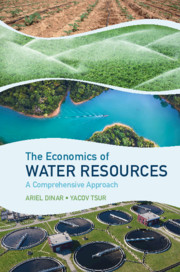Book contents
- The Economics of Water Resources
- The Economics of Water Resources
- Copyright page
- Contents
- Figures
- Tables
- Acknowledgments
- Introduction and Outlook
- Chapter 1 The State of Water Resources and the Need for a Comprehensive Perspective
- Chapter 2 The Water Economy
- Chapter 3 Supply Costs, Demands and Benefits
- Chapter 4 Optimal Water Policy
- Chapter 5 Water Regulation
- Chapter 6 Accounting for Uncertain Water Supplies
- Chapter 7 Case Studies of Regulatory Interventions
- Chapter 8 Economy-Wide Considerations of Water Management
- Chapter 9 Management of Transboundary Waters
- Index
- References
Chapter 7 - Case Studies of Regulatory Interventions
Published online by Cambridge University Press: 21 April 2021
- The Economics of Water Resources
- The Economics of Water Resources
- Copyright page
- Contents
- Figures
- Tables
- Acknowledgments
- Introduction and Outlook
- Chapter 1 The State of Water Resources and the Need for a Comprehensive Perspective
- Chapter 2 The Water Economy
- Chapter 3 Supply Costs, Demands and Benefits
- Chapter 4 Optimal Water Policy
- Chapter 5 Water Regulation
- Chapter 6 Accounting for Uncertain Water Supplies
- Chapter 7 Case Studies of Regulatory Interventions
- Chapter 8 Economy-Wide Considerations of Water Management
- Chapter 9 Management of Transboundary Waters
- Index
- References
Summary
The chapter presents case studies from Mexico and Spain of policy interventions that regulate groundwater extraction and use. The cases involve pricing, quotas, and removal of subsidies aimed at reducing negative externalities associated with groundwater over-pumping. The examples demonstrate the use of different policy instruments and their effects on the behavior of groundwater users in addressing negative externalities. The example from Mexico shows how a subsidy of electricity for pumping groundwater leads to perverse effects resulting in depletion of the aquifer. The example from Spain shows the negative effects of unregulated groundwater extracted for irrigation purposes on groundwater-dependent wetlands that contribute to ecosystem services.
Keywords
- Type
- Chapter
- Information
- The Economics of Water ResourcesA Comprehensive Approach, pp. 133 - 164Publisher: Cambridge University PressPrint publication year: 2021

